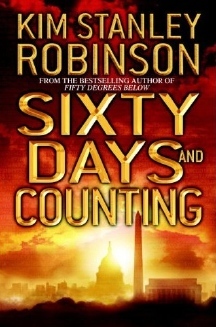 |
 Kim Stanley Robinson
Kim Stanley Robinson
Sixty Days and Counting
Reviewed by: Rick Kleffel © 2007
Del Rey / Bantam / Random House
US First Edition Hardcover
ISBN 978-0-533-80313-6
388 Pages; $25
Publication Date: 03-06-2007
Date Reviewed: 02-15-07
Index:
Science Fiction
General Fiction
Non-Fiction
The collision of the present and the future, of the already is and the could be, is a difficult moment to capture. Kim Stanley Robinson's Science in the Capital trilogy, comprised of 'Forty Signs of Rain', 'Fifty Degrees Below' and his newest novel, 'Sixty Days and Counting', manages to do so in a manner that is in every way unexpected. Funny when you expect it to be grim and powerful at the peripheries as well as the core, 'Sixty Days and Counting' is a thoroughly satisfying finish to a series that successfully captures the now and the next. Robinson's story is not a grim glimpse of the coming apocalypse, but a refreshingly positive and human story of how the mundane details of our everyday lives accrete to create a narrative much larger than those lives.
The three novels tell a single story, and should be read as such. Robinson offers readers science fiction as social realism to tell how science actually works in the United States and the world at large in this moment. In the first two novels of the series, we meet Charlie and Anna Quibler and Frank Vanderwal as well as their friends and families. Anna Quibler is a cog in the National Science Foundation, while Charlie is a science advisor to Phil Chase, a well-placed senator. Frank Vanderwahl is a scientist on leave from UCSD, working with Anna in the capital. ''Forty Signs of Rain'' took readers through events that bring the problems of global climate change into the lives of its characters, and 'Fifty Degrees Below' sees Chase elected President as the US population and government begins to realize that radical action will be required to avert global catastrophe. 'Sixty Days and Counting' follows the first sixty days of Chase's Presidency and beyond, as the Quiblers try to sort out their home life, Frank his love life and the world this little problem concerning a forthcoming species extinction event. Of the human race.
It is the human that the important aspect here. In 'Sixty Days and Counting', Robinson's story focuses on the characters and the effects of their individual actions as part of the enormous and creaking technology that the United States calls the Federal Government. He deftly combines domestic comedy with human comedy in the broadest sense in an environment chock-a-block with intriguing cutting-edge, current science. The novel does everything a great science fiction novel should do, but in a very unconventional manner. On one hand, the book does read like a low-key, current day domestic comedy. But the nuts and bolts of that comedy are no less than The End of the World As We Know It, both environmentally and politically.
Robinson works on a grand canvas through specific details. Readers watch Charlie Quibler play Mr. Mom until duty calls from a power no less than that of his friend, now-President Phil Chase. Frank Vanderwal's seriously odd love life involves a woman implicated in Presidential election fraud. The Quiblers and Vanderwal engage in bureaucratic infighting and get real science done to avert global catastrophe. Robinson offers passionate rants and inspired heights of invention that are both funny and thought-provoking.
As science fiction, 'Sixty Days and Counting' and the entire Science in the Capital trilogy operate in a subtle and subversive manner. Robinson is gritty and realistic in portraying the day-today practice of science, but within these boundaries, he tosses off speculative notions that create a sense of wonder about the here and now. He explores our understanding of humans as social animals, small-scale, cutting-edge genetic engineering and huge-scale environmental amelioration with equal aplomb. But these speculations are embedded in scenes of domestic and workplace comedy.
Everything is pretty complicated. For this reader, the scenes detailing the effects and symptoms of Vanderwahl's brain injury were toe-tapping bits of terror. Nothing is more frightening than brain damage. Charlie, on the other hand is worried about the state of his son's soul. A ritual performed by the monks in 'Forty Signs of Rain' has left Joe preternaturally calm. As much as the science geek in Charlie wants to deny that it could have something to do with rogue spirits and reincarnation, he finds Joe's behavior good to the point of being unsettling and opts for a very unscientific solution. It's fascinating to watch Robinson balance these approaches to our spiritual lives. He works both sides of the aisle with equal ease, and even revels in childhood hissy fits. He makes the reader revel as well, quite an accomplishment.
'Sixty Days and Counting' is something of a paradox. Robinson engages in fantastic and head-spinning speculation while telling a very realistic and rather funny story about characters we really like. He shows the world going to hell in a handbasket and yet there's an aura of almost sunny positivism. There are plenty of reasons to worry, but there are even more possibilities for change.
|
 |
